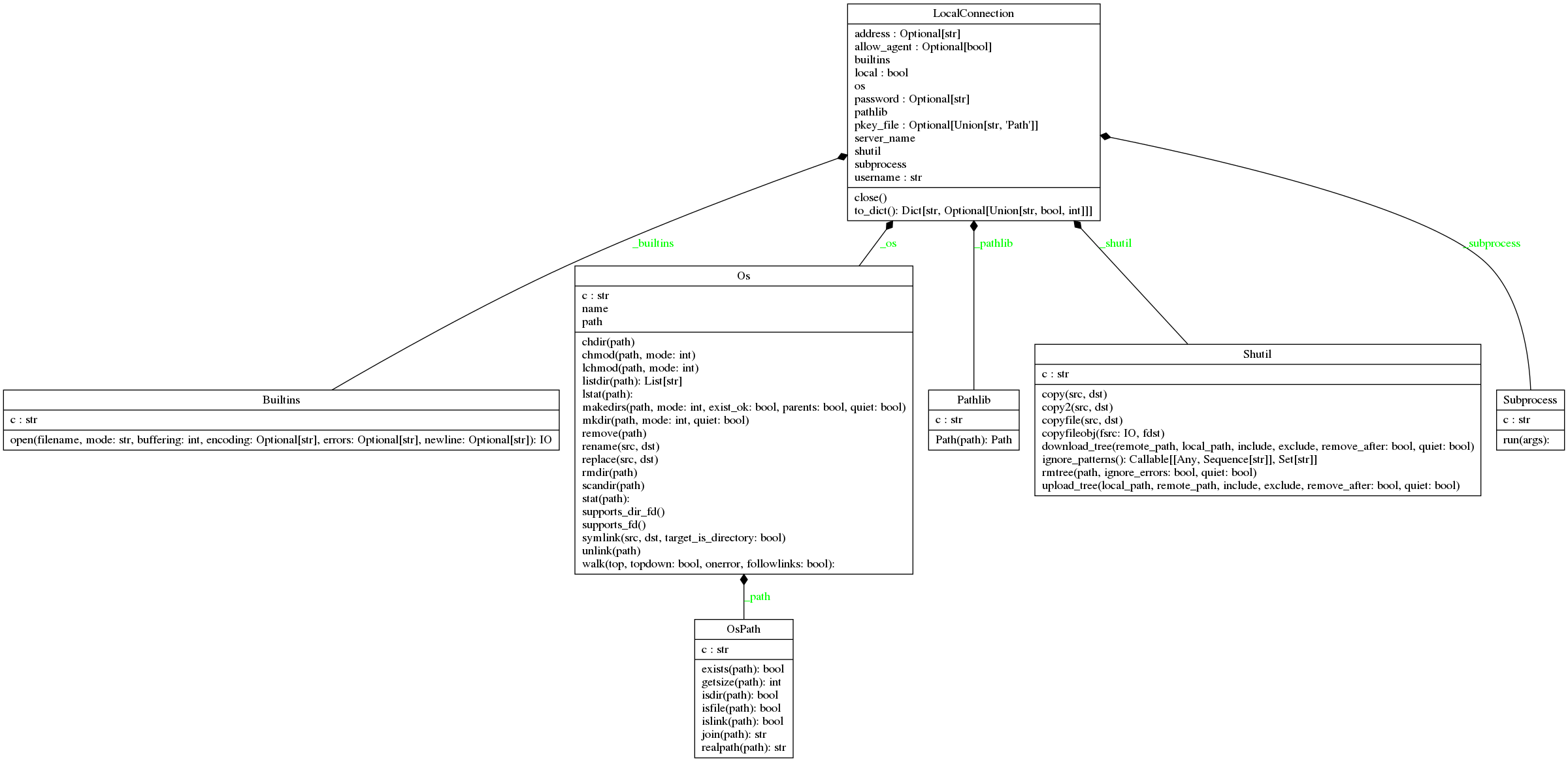Connection usage
local connection module graph

remote connection module graph

Instantiating connection
Connection factory supports dict-like indexing by values that are in
your ~/.ssh/config file. It can be made thread safe by passing
thread_safe=True argument to the constructor. Connection can also be
authenticated with ssh-agent. Your ~/.ssh.config file
is parsed upon module import and the Connection factory is indexable by
values in this file.
>>> from ssh_utilities import Connection
>>> Connection[<server_name>]
>>> <ssh_utilities.ssh_utils.SSHConnection at 0x7efedff4fb38>
More hosts can be simply added.
>>> from ssh_utilities import Connection
>>> Connection.add_hosts({"user": <some_user>, "hostname": <my_ssh_server>,
"identityfile": <path_to_my_identity_file>},
allow_agent=True)
Adding a host that will be authenticated by ssh-agent
>>> from ssh_utilities import Connection
>>> Connection.add_hosts({"user": <some_user>, "hostname": <my_ssh_server>,
"identityfile": None},
allow_agent=True)
Class can also be normally instantiated which is safer and with better typing support than dict-like indexing.
>>> from ssh_utilities import Connection
>>> Connection(<server_name>, <local>, <quiet>, <thread_safe>, <allow_agent>)
>>> <ssh_utilities.ssh_utils.SSHConnection at 0x7efedff4fb38>
Class can be also used as a context manager.
>>> from ssh_utilities import Connection
>>> with Connection(<server_name>, <local>, <quiet>, <thread_safe>, <allow_agent>) as conn:
>>> conn.something(...)
Connection can also be initialized from appropriately formated string. Strings are used mainly for underlying connection classes persistance to disk
>>> from ssh_utilities import Connection
>>> Connection.from_str(<string>)
All these return connection with preset reasonable parameters if more customization is required, use open method, this also allows use of passwords
>>> from ssh_utilities import Connection
>>> conn = Connection.open(<ssh_username>, <ssh_server>, <ssh_key_file>, <server_name>,
<thread_safe>, <allow_agent>)
>>>
Using connection - subprocess
This part describes how to use subproces-like methods in ssh-utilities
First let’s import needed modules and create connection instance. We will
assume that we have an entry in ~/.ssh/config belonging to remote
such as:
Host my_ssh_server
HostName xxx.xxx.xxx.xxx
IdentityFile ~/.ssh/id_rsa_my_ssh_server
User ssh_user
and ofcourse corresponding identity file has to be present too.
>>> from ssh_utilities import Connection
>>> from ssh_utilities.exceptions import CalledProcessError
>>> from pathlib import Path
>>>
>>> c = Connection("my_ssh_server")
>>> Will login with private RSA key located in /home/current_user/.ssh/id_rsa_my_ssh_server
>>> Connecting to server: ssh_user@xxx.xxx.xxx.xxx (my_ssh_server)
Next lets try to run some command.
>>> try:
>>> ls = c.subprocess.run(["ls", "-l"], suppress_out=False, quiet=False,
>>> capture_output=True, check=True, cwd=Path("/home/rynik"))
>>> except CalledProcessError as e:
>>> print(e)
>>> else:
>>> print(ls)
>>>
>>> Executing command on remote: ls -l
>>>
>>> Printing remote output
>>> ---------------------------------------------------------------------------------------------------------------
>>> total 4
>>> lrwxrwxrwx 1 ssh_user ssh_user 25 May 22 12:21 code -> OneDrive/dizertacka/code/
>>> lrwxrwxrwx 1 ssh_user ssh_user 27 Nov 5 2019 Downloads -> /home/ssh_user/Raid/Downloads/
>>> lrwxrwxrwx 1 ssh_user ssh_user 26 Sep 10 2019 OneDrive -> /home/ssh_user/Raid/OneDrive/
>>> lrwxrwxrwx 1 root root 9 Mar 20 2019 Raid -> /mnt/md0/
>>> drwxr-xr-x 28 ssh_user ssh_user 4096 Jul 22 13:24 Software
>>>
>>> ---------------------------------------------------------------------------------------------------------------
>>>
>>> <CompletedProcess>(
>>> stdout: total 4
>>> lrwxrwxrwx 1 ssh_user ssh_user 25 May 22 12:21 code -> OneDrive/dizertacka/code/
>>> lrwxrwxrwx 1 ssh_user ssh_user 27 Nov 5 2019 Downloads -> /home/ssh_user/Raid/Downloads/
>>> lrwxrwxrwx 1 ssh_user ssh_user 26 Sep 10 2019 OneDrive -> /home/ssh_user/Raid/OneDrive/
>>> lrwxrwxrwx 1 root root 9 Mar 20 2019 Raid -> /mnt/md0/
>>> drwxr-xr-x 28 ssh_user ssh_user 4096 Jul 22 13:24 Software
>>>
>>> stderr:
>>> returncode: 0
>>> args: ['ls', '-l'])
The API of run method resembles that of subprocess.run the first part of
the output is caused by suppress_out=False and quiet=False it is mainly
usefull for debugging. The second part is print out of the CompletedProcess
object that is the same as subprocess outputs, also the raised exception
CalledProcessError is the same as in subprocess. Other arguments have the
exact same meaning as in subprocess.run but currently only a limited subset
is supported. Nevertheless they should cover most usage scenarios. Notice that
cwd argument accepts also Path objects!
Note
All methods that take some path as argument accept str, pathlib.Path
and also ssh_utilities.SSHPath
Using connection - shutil
This part describes how to use shutil-like methods in ssh-utilities
>>> c.shutil.download_tree(Path("/home/ssh_user/test"), "/home/current_user",
>>> include="*.txt", remove_after=False)
output:
>>> Building directory structure for download from remote...
>>>
>>> Searching remote directory: MY_SSH_SERVER@/home/ssh_user/test
>>>
>>> |--> Total number of files to copy: 1
>>> |--> Total size of files to copy: 57.0 b
>>>
>>> Creating directory structure on local side...
>>>
>>> Copying remote: MY_SSH_SERVER@/home/ssh_user/test/something.txt
>>> --> local: /home/ssh_user/something.txt
>>> 100%|██████████████████████████████████████████████████████████████| 57.0/57.0 [00:00<00:00, 281b/s]
The output can be avoided if quiet=True.
- Other methods are:
upload_tree- function works in same manner asdownload_tree.send_files- send files specified by list of strings between local and remote directory in any directionrmtree- works exactly same asshutil.rmtreecopyfile- works exactly same asshutil.copyfilecopy- works exactly same asshutil.copyexcept it cannot preserve file permisionscopy2- works exactly same asshutil.copy2except it cannot preserve file metadata
Using connection - os
This part describes how to use os-like methods in ssh-utilities
>>> c.os.path.isfile("/home/ssh_user/.bashrc")
>>> True
>>>
>>> c.os.name()
>>> "posix"
>>>
>>> c.os.listdir(Path("/home/ssh_user"))
>>> ["file1", "file2", ...]
There are a few more methods which should cover basic usage, their names are
quite self explanatory. For more advances path and files manipulation use
SSHPath class.
Using connection - builtins
This part describes how to use methods in ssh-utilities substituting python
builtins, namely open function
>>> with c.builtins.open(<filename>, "r", encoding="utf-8") as f:
>>> data = f.read()
>>>
>>> data
>>> "... file constents ..."
Alternative initialization
The new API permits usage of individual sub-modules which can be handy at times
as a drop-in replacement for python module. We will demonstrate this on os
submodule:
>>> # all sub-modules are named same as python modules they replace, except
>>> # for the capital startinf letter
>>> from ssh_utilities import Os, Connection
>>>
>>> c = Connection("some-host")
>>>
>>> # now define remote version of os module, it must be tied to a
>>> # connection object
>>> os = Os(c)
>>>
>>> # now use it!
>>> os.path.isfile(<somefile>)
>>> os.stat(<somefile>)
>>> os.path.isdir(<somefile>)
>>> ...